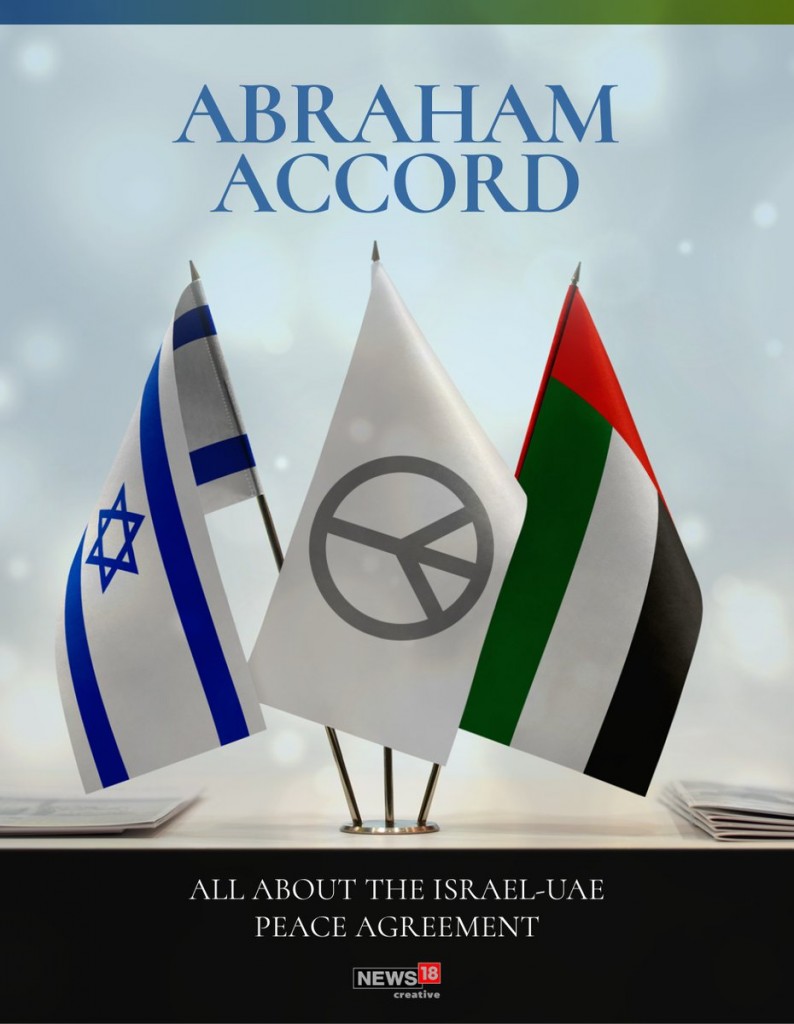ABRAHAM ACCORD
Tip Of The Iceberg?
Zuha Tiwana
What a Thursday [13th of August 2020] it was. For one side of the world, it brought a blessing in disguise while for the parallel side it is a nightmare coming true. I can’t move forward without crediting US President Donald Trump. He has hit a sixer on the last ball of the match. What a master stroke just before his elections. He has overcome the apparent defeat everyone has been predicting because of the poor performance during the pandemic and on economy. Uncle Sam has achieved what the world leaders couldn’t for so long.
Abraham Accord
The so-called “Abraham Accord,” which basically is a peace deal between the United Arab Emirates and Israel after good forty-nine years of sour terms. Announced by Trump on August 13, the deal has proved him a winner in the international diplomatic arena. If the planet were a kingdom, President Trump would be its king right now! He has ensured peace in the West. He made clear deal for the Muslims to be allowed to offer prayers in Masjid Al-Aqsa in Jerusalem. The Israeli premier has been convinced by Trump to stop annexation of the West Bank, or Palestine. The Abraham Agreement is a path towards stability and peace for the West.
A joint statement form the UAE, Israel and the US said: “This historical breakthrough will advance peace in the Middle East region and is a testament to the bold diplomacy and vision of the three leaders and the courage of the United Arab Emirates and Israel to chart a new path that will unlock the great potential in the region.” The agreement was reached after talks between Trump, Abu Dhabi Crown Prince Sheikh Mohammed bin Zayed and Israeli Prime Minister Benjamin Netanyahu.
Reactions
There have been mixed reactions on the deal across the globe. According to these reactions, it can be inferred that peace has a fair chance to return to the region, though the treaty itself has angered a lot of sections on both sides.
Arab countries
Egypt, being a close ally of UAE, welcomed the agreement. The president hoped that the deal brings peace to the region. Oman’s sultanate has welcomed the deal as it would stop the annexation of Palestinian lands. Bahrain has described it as “historical” and that it would strengthen the “stability of the region”. Jordan conditioned the success of the deal with the future actions of Israel in the region. Overall, the Arab countries have given a positive feedback to the deal.
Unlike the aforementioned states, many have showed strong condemnation towards the deal.
Saudi Arabia, one of the close allies of UAE, has kept silence over the issue. Palestine has given a strong negative reaction by declaring the deal as stab in the back. The Palestinian Authority said that the deal was reached in the shadow of Israel’s plans to Judaize the Masjid Al Aqsa. Hamas, Fatah and Islamic Movement have also decried the deal. Libya called it a betrayal of the UAE towards Palestine as it did with Libya, Syria and Yemen.
Turkey
Turkey lashed out at UAE for their decision to normalise diplomatic relations with Israel. Turkish Foreign ministry said that UAE, by no right, can decide for the Palestinian future alone. Erdogan also mentioned down-swinging the ties with UAE and recalling its ambassador.
Iran
Iran’s foreign ministry called the deal a “dagger that was unjustly struck by the UAE in the backs of the Palestinian people and all the Muslims”. Iran has labelled it as a “strategic stupidity” from Abu Dhabi and Tel Aviv.
China
China has welcomed the peace deal by considering it as a pleasant act in efforts to de-escalate the rising tensions in the region. The Chinese Foreign minister Zhao Lijian said, “We hope that the relevant parties can take concrete actions so that the Palestinian issue can return to the equal footed dialogue and negotiations.”
India
India too stands to gain from the deal. Israel has always been a close ally to Modi government and UAE, too, shares healthy relationship with New Delhi. Both coming together have paved the way for better diplomatic environment for India.
Pakistan
Pakistan has shown a very cautious reaction to the deal. Pakistan declared this development as having “far-reaching implications”. Foreign Ministry said that Islamabad’s approach would depend on “our evaluation of how Palestinians’ rights and aspirations are upheld and how regional peace, security and stability are preserved.
Implications of the Deal
The recognition of Israel by UAE is just a tip of the iceberg. The real insinuations of the deal are yet to come. First and foremost, the peace deal has cleared ways for more Arab countries to have strong diplomatic relationship with Israel in the coming years. The allies of UAE will most likely follow its footsteps in this regard.
The timing of the deal is also very crucial. In the time of pandemic where the economy and health conditions are worst, the Gulf States will get a great assistance from Israel to combat the virus.
The tense relations of the Gulf States with Iran are also a crucial element at present. Iran has hostile relations with the West and UAE, and many of its neighbours will try getting tremendous military aid from Israel. The bloc against Iran will be more powerful and highly obstructive for Iran.
I can foresee an impasse in the cause of Palestine. The acceptance of Israel by the Gulf states is a clear message to the world that they are done with Palestine issue and need to move on to stabilize their respective diplomacies. Palestine will lose its years of struggle against the cruelty of Israel.
I think, sooner or later, Saudi Arabia will also join the alliance. It has no valid reason to stay aloof of the great bloc of the West and US. If it joins the alliance, oil export will be smooth and more mutual agreements could be signed with the allied states.
The Muslim Ummah, however, seems to be divided into two opposite blocs. Mahatir Mohammad said,” UAE-Israel deal divides the Muslim world into warring factions and in this the Israelis will add fuel to the fire”. The deal will definitely prove to be a vote for Israel in its claim of Palestine belonging to Israel. A strong reaction by Palestine is also a sign of prolonging war in the Middle East.
Only three of the ASEAN member countries; Indonesia, Malaysia and Brunei, have not accepted Israel. Now they will reconsider their decisions and may turn the tables around for the Muslim Ummah. In general, this deal can bring a major setback to the Muslim Ummah because the Muslim blocs will follow different directions and the enemies of Islam will leave no stone unturned to harm the Muslims.
Implications for Pakistan
Pakistan will be in a difficult situation after the deal. It couldn’t have ruined its relations with the Saudis at a worst time. The peace accord means that US$ 3 billion debt struggle will worsen for Pakistan. This will, in return, damage the Kashmir cause. The peace accord is a direct red signal for Kashmir because the UAE and other Gulf states are now thinking of the progressive ways out towards better technological, economic and energy programmes.
Conclusion
To cap it all, ahead of the presidential elections, Trump has silenced everyone with his achievement. He is virtually untouchable now on the matters of international diplomacy. Credit should be given to him as well. On the other hand, Pakistan and the Muslim world are apparently in a big trouble here. Moving towards peace and stability of the region at the cost of millions of Muslims and their sentiments can never be justified. And above that, it is just the beginning and the world has much more to see post-Abraham Accord. The hidden policies and deals are yet to be unveiled.
The author is a psychologist, writer and counsellor.
 Jahangir's World Times First Comprehensive Magazine for students/teachers of competitive exams and general readers as well.
Jahangir's World Times First Comprehensive Magazine for students/teachers of competitive exams and general readers as well.




